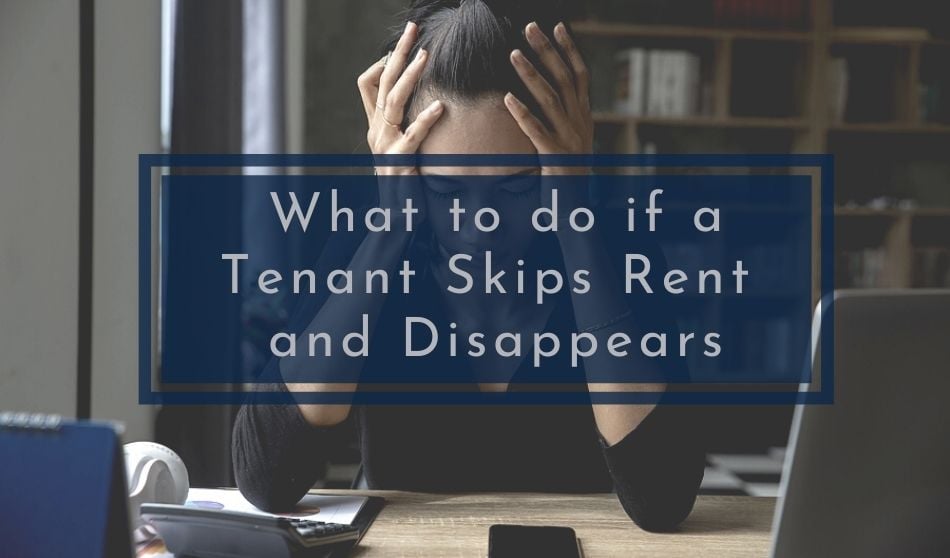
If you suspect that your renter has disappeared and has no intention of returning to the rental property, you need to follow the appropriate steps before moving forward with re-renting the property.
Before taking any moves towards re-renting the property, you need to check your state and local laws regarding rental property abandonment. Complying with these laws will help ensure that the landlord is back to re-renting the property and recouping lost income as soon as possible. Failure to follow these rental laws can result in fines and legal actions against you and your business.
Why Tenants Skip Rent or Disappear
Tenants tend to vanish because they are behind on rent or owe other unpaid fees, are facing an eviction, or don’t want to go through a legal lease-breaking process. Currently, with the COVID-19 pandemic, record unemployment has been a driving force behind drops in rent payments. If a tenant belives they cannot pay rent indefinitely, they may decide to skip rent and move unannounced. There is also the chance that something horrible happened to your tenant, like death or kidnapping, or that your tenant is running from some other dangerous situation.
If you believe your tenant’s disappearance is the result of criminal activity, contact the police immediately. You will most likely be able to move forward with an eviction or abandonment process, but working with the police will ensure you receive their permission without tampering with a potential crime scene.
In most cases, landlords deal with tenant abandonment due to a choice made by the tenant to leave the property without contacting the landlord. If this is the case, follow these steps to establish abandonment and re-lease the property.
Step 1: Establish abandonment
You cannot just assume that because your tenant is behind on rent and you haven’t heard from him a few days that the property is truly abandoned. They could just be a poor communicator with the intention of returning despite the late rent and/or late fees.
You need to clearly establish abandonment in order to meet your state’s legal requirements.
How to establish abandonment:
A tenant may move out and leave you a note saying his intention to never return. Or perhaps the neighbors witnessed the tenant moving in the middle of the night. Other times, you simply might not be able to get ahold of the tenant for an extended period of time.
If you are unsure about whether the tenant has truly abandoned the property, find the answers to these questions from RentPrep:
- Is the tenant behind in paying the rent? Many states won’t consider a rental abandoned if the rent is current.
- Are the utilities shut off? A quick call to the utility company will provide you with this information, however, this also may be a coincidence for nonpayment and not necessarily abandonment.
- Is there anything left in the rental unit, like furniture or clothes? If there are valuable items left behind, it’s less likely to be abandoned than if you find garbage or rotting food.
- Did the neighbors notice anything significant? If others witnessed a moving truck at the property the other day, or the tenant told them they were leaving, it helps to solidify other evidence of abandonment.
- Has a change of address been submitted to the post office? A quick visit to the local post office will help you figure it out.
- What do the tenant’s emergency contacts say? You must get in touch with the tenant’s emergency contacts to see if they offer any insights into the tenant’s absence.
No single factor is conclusive—instead, you must consider several things before you can conclude that the property is abandoned. It’s a fine line between a tenant abandoning a property and simply being gone for a while. Unusual circumstances, such as an extended vacation or business trip, a hospital stay or even jail time can make it seem as if the tenant has abandoned the property when legally they are still in possession as long as they have not broken the lease terms.
Step 2: Notify the Tenant
In order to officially establish abandonment and terminate a lease, a landlord might have to notify the renter about the belief of abandonment.
For example, in California, if you if you believe a tenant has abandoned the property with no intention of returning, you must provide an official notice to the tenant at the tenant’s last known address stating your belief that the property has been abandoned ( Section 1951.3 of the CA Civil Code). This “Notice of Belief of Abandonment” gives the tenant 15 days to respond that the property is not abandoned otherwise the lease will be officially terminated. If a lease is terminated due to abandonment, any unpaid rent and fees are still the responsibility of the tenant.
Civil Law Self-Help Center warns landlords to be extra careful when dealing with an abandoned property, “unless your tenant has surrendered or abandoned possession of the rental property, you must file an eviction case in order to remove the tenant! (NRS 118A.480.) If you lock the tenant out of the property, use force or threats to remove the tenant, or terminate the tenant’s utilities or services, you could be sued by the tenant and punished by the court.”
Most landlord forums advise you to work with an attorney familiar with landlord-tenant laws in your state when dealing with a disappearing tenant.
Can I just evict a missing tenant?
In order to establish abandonment, one of the criteria a landlord must prove is that a renter is behind on rent a certain number of days.
Under typical circumstances, a landlord may also choose to also move forward with a legal eviction if a tenant has not paid rent in a certain number of days.
The normal process goes as follows:
A Pay Rent or Quit Notice usually gives tenants 3-5 days to pay rent or move out (“quit”). If the tenant does neither in the designated timeline, you can move forward with filing an eviction. The only problem with delivering a Pay Rent or Quit Notice can arise if a tenant does not receive the notice because he abandoned the property. This can severely delay the eviction process, which is why some landlords will try to establish a belief of abandonment to terminate the lease and gain writ of possession over the property.
Current eviction moratoriums will further complicate matters. You will need to keep federal and state guidelines in mind, and potentially seek legal advice on how best to proceed in these unusual circumstances.
The Lease
Your lease agreement should include language that defines abandoned property terms and what steps you will take to establish abandonment. Make sure these lease terms meet your state and local laws and have been reviewed by an attorney.
What Do Landlords Do With Abandoned Tenant Property?
Besides the residence that might have been abandoned, if your tenants left personal property behind when they left unexpectedly, you have to follow your state laws for handling abandoned tenant property.
Typically, a landlord has to itemize the abandoned items, store the property, and notify the tenant of the itemized property and where it is stored. If the landlord fails to hear from the tenant after a certain amount of time, the landlord can sell the items to pay for the storage and issue any remaining money to the state. Check your state and local laws for specifics on how to handle abandoned tenant property in your state.
Avoid Disappearing Tenant Nightmares
The confusing laws regarding adornment rental property can be a nightmare for any landlord or property manager. Sticking to thorough tenant screening gives you the best chances of avoiding these types of situations.
Past landlord references will be key in identifying whether or not your rental applicant has a history of abandonment. You can also check a rental applicant’s criminal background to see if any evictions or lawsuits have been filed about past due rent (or any other unpaid bills for that matter). Also making sure a rental applicant has a reasonable debt-to-income ratio, found on a credit report, can give you an idea about a tenant’s handle on their finances.
This article was originally published in Oct. 2017 and has been updated.






Yes. I am in this mess real deep. No one rental. I letting this business go. God help others and myself.
Check your state and local laws for specifics on how to handle abandoned tenant property in your state.
I agree 100% – always great advice!
Thank you for sharing with us, and we sincerely hope you will continue to update or post other articles.
Thanks for your feedback. We love providing useful information to tenants, landlords, property managers, and investors!
Great post and I like it.
Thanks, Beston! Glad to hear you liked it.
My mom rented out her property fully furnished and the tenant has not paid rent for 3 months and has disappeared, along with stealing her mattresses along with other personal property. What does she do!?! We already filed a police report and insurance claim.
Oh my! That must have been shocking. Glad you took those first steps to file a police report and insurance claim. From there, have her contact the local housing authority to find out the next steps needed for taking possession of the rental as every state has different regulations when a home is abandoned. I can’t give legal advice so have her contact her rental legal advisor to discuss legal options such as pursuing the skipped rent in small claims court. I wish her all the best!
What does everyone think about Oregon’s SB608? I am both a renter and work as an apartment manager and I think it violates the landlords constitutional rights. The law limits the amount of a rent increase, requires a landlord to give tenant 90 days notice to vacate AND they have to pay the tenant a months rent when they move out! That is CRAZY! Of course tenants can still move out with only 30 days notice, which is unfair and definitely not equal treatment under the law. It is bad enough that we no longer have a way to report judgements and unpaid bills to the credit bureau to at least show that the tenant doesn’t pay their bills, now we have to pay them to vacate a unit when they are repeatedly violating their rental agreements or disturbing other tenants but they are not doing something so outrageous where we can evict them more quickly!
Yes, even worse here in Multnomah County, we have to pay a top end $4500 ‘moving expenses’ to get them out on a Without Cause, and only then for specific stated reasons (family member, selling, or complete remodel if I recall). The rent increase lowers to 9.3% max, which is o.k., but not keeping up with the market (I’ll let this one go, as stable tenants deserve not to be jacked too much each year, really… turnover is costly, in other words) … what gets me is the lame-duck nature of a 1-year lease agreement, it really only protects the tenant in that you fixed the rate of the rent for 12 mos. … beyond that you can’t up and say, well “thank you, we will not be renewing a one-year lease”, it will automatically roll over to month-to-month, to wit, you can send out rent increases. So we (as owner-managers) level-set on only doing 1 year lease, for move-in, and then rent increases … again, to “not make tenants think” about where they will be in 1-year from now, every year … most people don’t “like” to move, and if given the oppty to stay, with fair increases and ‘the option’ to give as you say a 30 day notice … that flexibility is fine. Never big on lease break fees, etc. as in this market, a smooth turn results in “new base rent” establishment … so we make it easy for them to leave if they want. Why fight it, need to figure out strat within the rules. We stil use other 3-day, 24-hour and other notices for lease violations or non-payment and have had a few evictions that way. We did run into what you say, in our Eugene property, to get a long term tenant out (legit) to have our son attend UofO in the fall and stay … and yes, pay the 1 mos. rent 90 days ahead to the tenant, along with the notice. Not ideal, and like you say a bit lopsided in favor of the tenant, here, from a pure cash standpoint. C’est la vie. (Can’t fight city hall)
If a tenant left the residence on December 9th. Now refuses to come collect their belongings, pay rent, or even civilly communicate with me. What are my options on getting their stuff out. Currently they have no forwarding address so i can’t even serve him with legal eviction paperwork. He is currently sleeping at a homeless shelter bouncing around so i can’t find him.
Establishing abandonment and taking possession can be tricky in regular circumstances but eviction moratoriums may complicate the issue. Some states allow you to serve notices to the rental address in the thinking they still are checking mail. But, because regulations differ across the country, I would highly recommend contacting your local housing authority to understand the steps needed to establish abandonment, take possession, storing and handling belongings, and evictions. Secondly, one misstep might delay your ability to remove them so I would contact an attorney familiar with evictions and rental laws prior to beginning an eviction.
Really a great post! Thanks
My tenant gave notice of not renewing their 6 month lease that is up 02/01/2025. So they told me they would be out the last day of February. On February 1 tenant texted me she would pay half the rent on the 2nd and the rest on the 20th of February I said it would be ok. But I guess they moved out without telling me and didn’t pay the rest of the months rent and they left a mess and garbage thrown through out the house. They left the keys and garage door opener on the counter. Is there anything I can do to get the rest of the rent and money due to cleaning up and disposing of the garbage they left behind??
Hi Isabel, You may be able to charge additional fees/deduct from the security deposit for the cleanup and may be able to still charge for the remainder of the month. However, you’ll want to review your lease agreement and local landlord-tenant laws to assess what recourses you may have. (For instance, you may not be able to consider the property abandoned given the notice of non-renewal.) If you are unsure about your next steps, I would absolutely check in with an attorney that can help you navigate landlord-tenant laws in your area. They may also be able to help you solidify any areas of your lease that need to be better outlined for your next tenants, so you can confidently navigate any potential situations in the future.